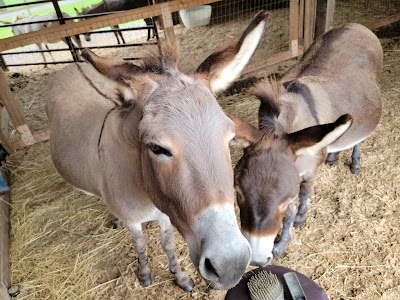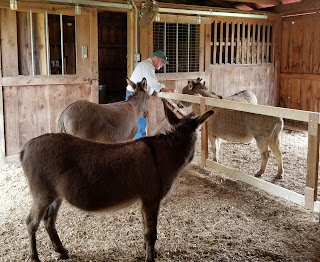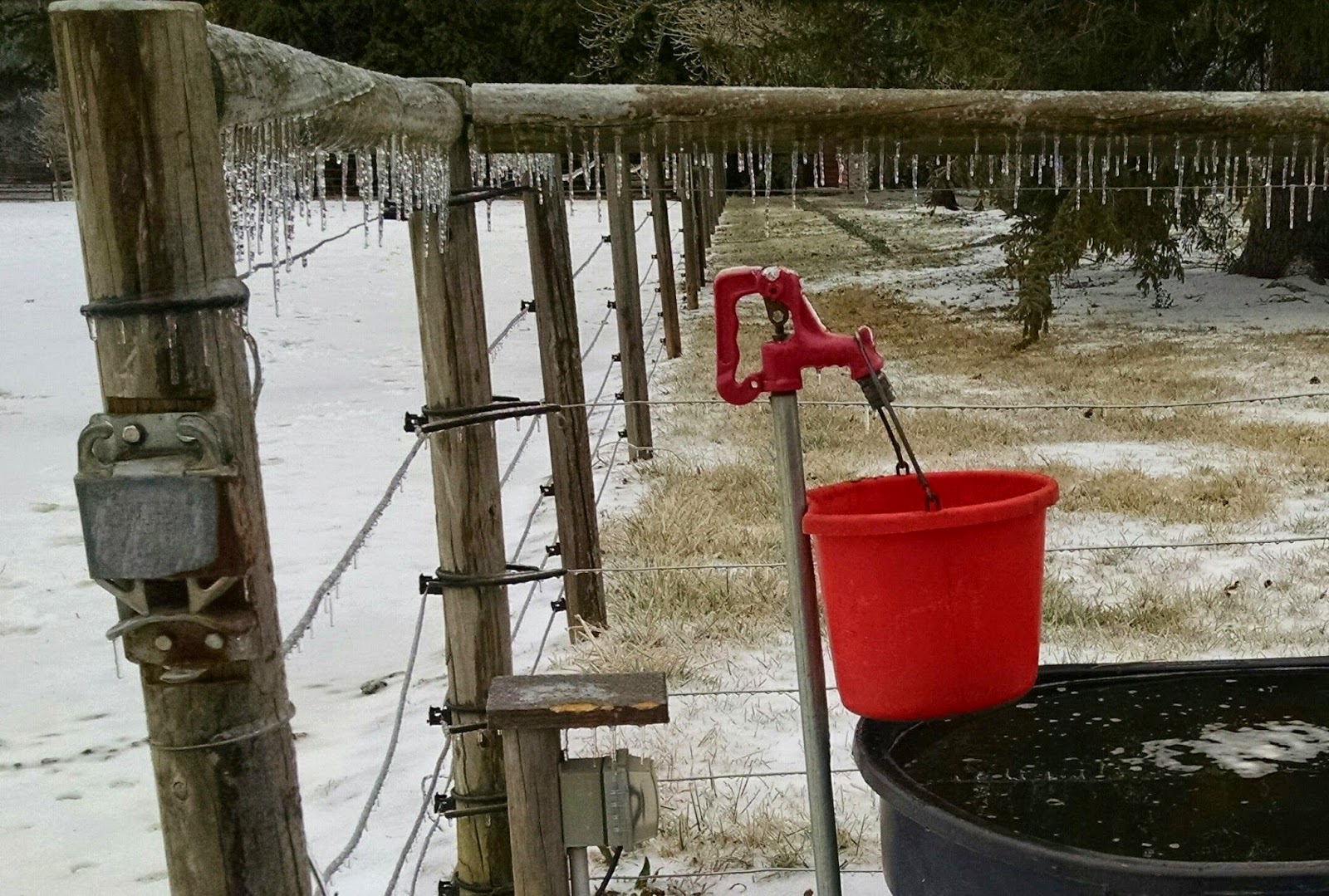Our Tiny Farm in early summer
I hardly know where to start because it has been so long since I've posted an update here. Sorry about that. My job with NC State University seems to consume more and more of my time as the years go by. Fortunately, I love my job, but I would like to have more time to spend on the homeplace, too.
So, let me do a quick chronological update starting in fall 2012.
Our new steers
The pasture raised beef we produced and sold in late fall 2011 was OUTSTANDING! So in October 2012 we got two young steers to raise the same way. Good pasture, clean mountain water, lots of fresh air and sunshine, and daily attention and a cookie; that's how we do it. The meat we harvested in fall of 2011 was vacuum packed and frozen. We are still eating some of that meat now (only have a few roasts and steaks left) and it is still just as fresh tasting and delicious as it was when we first brought it home. The vacuum packaging and storage at below 0 degrees F really maintains the quality. We will probably harvest these two in October or November when we have two new ones arriving. Because we only raise two at a time, if you are interested in buying a quarter or half, you should contact us and reserve it now.
The last market day on the Mills River Farmers Market in 2012
We finished out the 2012 selling season at the special holiday market day in November at the Mills River Farmers Market on Hwy 280 in Mills River. It was cold but sunny and with carolers right next to our booth, very festive. We sold lots of honey, potatoes, garlic, popcorn, and some of my hand-knit and crocheted hats, scarves, capes, and bags. It was a great way to finish the season.
Hagar, the world's greatest donkey. May he rest in peace.
Seven months have passed and it is still difficult for me to write about this without tearing up. If you follow any of my social media outlets you know that Hagar, my donkey, was my best pal. I loved this donkey the way many other people love their dogs. He was so smart and affectionate, and mischievous. Unfortunately, in early December he suddenly became quite ill. We raced him down to the horse clinic in Tryon but they could not save him. An autopsy revealed that something had poisoned his liver. We worked with three vets, our neighbors, our feed supplier, and other local experts to figure what he could have eaten that poisoned him. We had the feed and hay tested. We walked the pasture looking for toxic weeds. Nothing was obvious. We will never know what took dear Hagar's life, but I suspect it was chicken feed. When we moved the chicken tractor each day, there were always a few chicken pellets on the ground. Hagar would gobble those up right away. I know those pellets wouldn't hurt him when fresh because we made sure to buy chicken feed that did not contain any antibiotics or hormones that could harm him (and there are brands that contain those, so read the labels). But, I suspect that sometimes he missed a few pieces and came back to get them later. And if wet, chicken feed goes bad very quickly. From what I learned about mold toxins, if he was consuming a little of it frequently over time it could have been slowly damaging his liver for a long time until it finally reached a critical stage. Like I said, we will never know for sure, but from what I have learned, having damp chicken pellets where your horses or donkeys could possibly eat them is not a good idea. We have since sectioned off a portion of the pasture with temporary fencing just for the chicken tractor so the equines cannot access any spilled feed. Also, did you know that some cattle feed and mineral blocks are also toxic to horses and donkeys? Watch for rumensin. If that is added to the cattle feed it is highly toxic to horses. Again, the feed we buy does not have rumensin, but many brands contain it. I am shocked that we did not even know to be watching out for these things until this incident.

Bee hives
Honey is a major crop for us. It has great flavor and our customers love it. Unfortunately, we lost all but one of our hives this winter. We have spent a good deal of time, effort, and money rebuilding our hives this summer. As of July, the new hives look good except for one which is missing a queen. We are going to try a new method we learned to remedy that. The loss of bees was great in our region this year, so expect honey to be in short supply and more costly than last year.
The sweet gentle giant we boarded, Sir Big
It was an emotionally draining winter on Our Tiny Farm. We had been boarding this beautiful Belgian horse for about 18 months. He was a very sweet old guy and his owner loved him dearly. He had arthritis and had been limping for months, but he seemed to be managing okay. Very suddenly, however, his hip got so bad he could no longer support himself. He also had to be put down very quickly. It was a shock for all of us. Rest in Peace, Sir Big.
Our new baby mini-donkeys. Are they cute or what?
Our farm just seemed so empty without Hagar and Sir Big, so we began thinking about getting another donkey. Our vet and farrier both suggested that we get a mini-donkey. Well, it just so happens that the farm behind us raises mini-donkeys. Our neighbor told us he had some young ones for sale and on Easter weekend, Chester and Meadow came to live with us. They were both about six months old when we got them. Chester appears to be a true miniature donkey (will be under 36 inches tall) and has a short kinked tail. Meadow is a little bigger and might top out as a small standard (36 to 48 inches tall). They are both super cute, loving, curious, and fun.
Duchess, the new boarder
We missed the income from our boarder, so this spring we brought on a new boarder. Her name was Duchess and she was a five year old Tennessee Walker. Tall, beautiful, proud, and a mare. We had never had a mare on the farm before and didn't quite know what to expect. Well, Duchess was going to be the boss of the farm. She harrassed Little Man, our 27 year old Tennessee Walker gelding, and chased the little donkeys all over the pasture. Within a short time, we had the barn, the paddock and the pasture divided in two. Little Man and the mini-donkeys were on one side and Duchess on the other. Little Man became very protective of the mini-donkeys, like a mother hen and her biddies, but he clearly wasn't happy. It was sad to see our old horse looking depressed, so on July 1 Duchess moved to a new home. We are now looking for another boarder. Preferably a mature gelding who gets along well with other horses.

Little Man and his charges. This was taken in spring when everyone still had their big heavy coats on.
Chester in his fly mask
We are strong believers in fly masks for our equine friends, so when fly season started, in addition to using fly predators we purchased two little fly masks with ears for the mini-donkeys. The velcro sound freaked them out at first, but they quickly learned how helpful they are. Now every morning after they have had a little grain, they hold up their heads and let us slip on their masks. Okay, maybe they aren't that cooperative every day, but Little Man is.
We had a healthy harvest of snap peas.
The market garden was doing great this spring and we had wonderful snap peas, kale, garlic, elephant garlic, shallots, and new potatoes. And then the rains came...and they have never left. As of July 20 we have had more than 23 inches of rain over the average for this time of year. That combined with late blight has devastated the tomatoes and we don't know if we can get the rest of the potatoes dug before they rot. The corn and eggplant still look good and if the rain will slow down, we will put in a fall garden.
Foamhenge near Natural Bridge, VA
We made a trip up to Pennsylvania at the end of June and decided to stop and visit fun places along I-81 in Virginia. Just had to share this picture with you. This is "Foamhenge". A full-size replica of Stonehenge done in styrofoam. Unfortunately, weather, time, and vandals have done a great deal of damage to it, but it is still impressive and fun.
Chicken tractor for sale
So now what are we up to? We are putting in a new pasture this summer and designing a permanent chicken coop with multiple runs so we can rotate the birds on the land. This chicken tractor was a great learning tool, but with the size farm we have, we think a permanent coop will be more practical and efficient. Also, with hubby's physical limitations, it was just too big and awkward for him to move. Since we can't mix these six old ladies with a new young flock, we put up ads on Craigs List and Facebook today offering this chicken tractor and the hens to a good home for $10. The response has been overwhelming! So, next spring we might have eggs for sale for you.
Beautiful summer sunset over Our Tiny Farm
So, that completes the quick update on Our Tiny Farm. I will try not to go so long without posting, but I can't promise anything. My job is keeping me very busy, there is always something to do on the farm and in the house, and I'm going to start revising my book in August. But, come out and see us at the Mills River Farmers Market later this summer. We plan to have honey, garlic, and popcorn again. And there will be beef in time for Thanksgiving (those are the plans, anyway).
























































